Tag archives: science and society
The August 2015 issue of Physics World is now out
By Matin Durrani
Mention the two words “science policy” and most physicists’ eyes will probably glaze over. Most of us dream of discovering a new planet or finding the Higgs boson – not poring over budget spreadsheets, championing science to politicians or commenting on legislation.
But science policy is vital in today’s world, which depends hugely on scientific research and in the cover feature of the August issue of Physics World, which is now out, Len Fisher and John Tesh offer 12 practical tips for scientists who want their ideas incorporated into science policy. You’ll be intrigued by what the two authors have to say.
Elsewhere in the issue, as my colleague Tushna Commissariat explains in the video above, there’s a great feature based on an interview with the French physicist Hélène Langevin-Joliot – the granddaughter of Marie Curie. In the article, Langevin-Joliot explains what’s known as the “Curie complex” and gives her own tips for scientific success. Langevin-Joliot didn’t suffer from the complex herself, but she acknowledges that it is a big problem for others and, these days, spends her time actively promoting careers for women in science
Former Indian president APJ Abdul Kalam was a ‘scientist and a statesman’
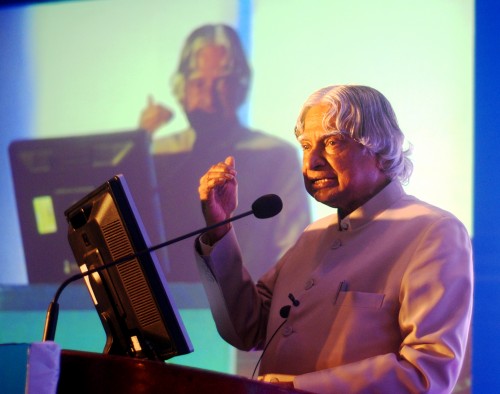
Missile Man: APJ Abdul Kalam delivering a speech in 2010.
(CC BY 3.0/Pushrakv)
By Tushna Commissariat
This week, India is mourning the loss of an esteemed leader – the country’s 11th president APJ Abdul Kalam, who died on Monday. Kalam was in office from 2002 to 2007 and enjoyed country-wide popularity, even post his presidency. Described by US president Barack Obama as a “scientist and a statesman” in his eulogy, Kalam was a physicist and an aeronautical engineer before he turned to politics, first acting as a science administrator and adviser for nearly four decades before his office run. Indeed, he was heavily involved in India’s nuclear tests and its military missile programme, earning him the moniker of “Missile Man”. In 2007 he was awarded the Royal Society’s King Charles II Medal, which is “awarded to foreign heads of state or government who have made an outstanding contribution to furthering scientific research in their country”.
View all posts by this author | View this author's profile
Rediscovering Marie Curie and the pioneering women of science
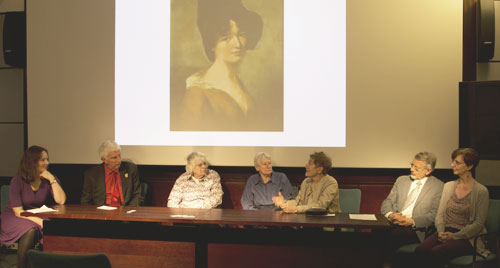
The panel of speakers at the women in physics conference. (Courtesy: Institute of Physics)
By Tushna Commissariat
This Sunday, as the world celebrates International Women’s Day, I’ll be thinking of some amazing women who had a huge impact on the world of physics, helping shape the field as we know it today. Indeed, yesterday I was at the Institute of Physics in London, attending a day-long conference on “The lives and times of pioneering women in physics” hosted by the Institute’s Women in Physics group along with its History of Physics group. While there were a host of interesting speakers at the event, undoubtedly the star of the day was French nuclear physicist Hélène Langevin-Joliot, granddaughter of one of the 20th-century’s most famous female physicists – Marie Curie.
What makes a physics experiment go viral?
By Tushna Commissariat
Physics experiments are not normally the stuff of “viral” videos on the Internet, but that is precisely what happened when physics students at the University of Bath in the UK decided to get creative with the Leidenfrost effect. If you are a regular reader of Physics World, you may get that déjà vu feeling when you watch the video above of water droplets zipping about the “Leidenfrost maze” built by (at the time undergraduates) Carmen Cheng and Matthew Guy – but rest assured you have seen it right here on this blog in 2013 when editor Hamish Johnston wrote about it before it amassed a whopping 120,150 views on YouTube.
View all posts by this author | View this author's profile
Science cleans up at the Oscars
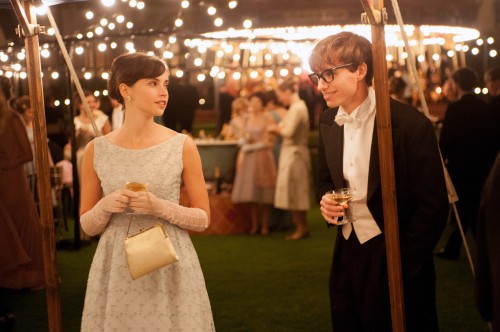
The Theory of Everything depicts Stephen Hawking’s relationship with first wife Jane. (Courtesy: Universal Pictures International)
By Tushna Commissariat
In a sweeping win for science-themed films at this year’s Oscars, British actor Eddie Redmayne has won the best actor award for his portrayal of the theoretical physicist Stephen Hawking in the film The Theory of Everything. Redmayne, 33, plays Hawking in the biographical film that was inspired by the memoir Travelling to Infinity: My Life with Stephen written by Hawking’s former wife Jane, who is portrayed in the film by the British actress Felicity Jones. The Theory of Everything was also nominated for best picture, original score and adapted screenplay, while Jones was nominated in the best actress category. Redmayne’s success at the Oscars comes after his win in the best actor category at this year’s Bafta awards, which also saw The Theory of Everything pick up best film. The movie chronicles Jane’s relationship with Hawking – from the early days of their courtship to Hawking’s diagnosis of amyotrophic lateral sclerosis at the age of 21 and his success in physics until the two divorced in 1995. I was lucky enough to attend an early screening of the film, and I thought it was a very worthy candidate for the awards season. You can read my review of the film here.
View all posts by this author | View this author's profile
Poetry please, a protein-folding app for your phone, and a new home for the Institute of Physics

Artist’s impression of the new headquarters of the Institute of Physics.
By Hamish Johnston
You may not know it, but you could be a poet.
The European Space Agency (ESA) and the Hubble Space Telescope have just launched a contest to find the best “Ode to Hubble” as part of the celebrations for Hubble’s 25th birthday. Although described as an ode, the contest is actually looking for a short video tribute to Hubble that can include verse, song, prose as well as still and moving images. The piece can either be about the telescope or one of its many discoveries. There are two age categories, one for “generation Hubble” – those born after its launch – and one for over 25s. So look to the stars and get those creative juices flowing.
The physics of pop music, a stroll around the LHC, 3D illuminations in Bath and more

Pop physics: some of the subgenres used in a study of pop music. (Courtesy: Gamaliel Percino, Peter Klimek and Stefan Thurner/PLOS ONE 10.1371/journal.pone.0115255)
By Hamish Johnston
The take-home message from this week’s Red Folder is that “Scientists just discovered why all pop music sounds exactly the same”, at least according to an article on Music.Mic. The report describes a paper published in PLOS ONE by Stefan Thurner – a physicist at the Santa Fe Institute – and colleagues at the Medical University of Vienna.
The researchers used the online music database Discogs to sort the material on 500,000 albums into 15 musical genres and 374 subgenres. You can see examples of some of the subgenres in the above image. They discovered that as a genre of music becomes more popular, it becomes less complex as all its constituent artists and songs start sounding the same. Music.Mic’s Tom Barnes explains in his article how this ties in with various trends in the music industry, where he says “uniformity sells”.
View all posts by this author | View this author's profile
Season’s greetings and last-minute gift ideas
By Hamish Johnston
Things are winding down for the holidays at Physics World and we are all looking forward to recharging our batteries before we get stuck in to all the exciting physics that is sure to come our way in 2015.
If you are like me, you probably haven’t finished your Christmas shopping so here are a few suggestions that are sure to get a smile out of the physicists in your life. In the above video, author and scientist Neil Downie recommends a few traditional gifts as well as several quirky presents. I’m not sure that many people have a retort stand on their wish list, but I would certainly welcome a multimeter if I didn’t own one already.
View all posts by this author | View this author's profile
Prizewinning book gives materials science a chance to shine
By Margaret Harris
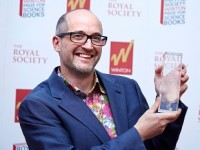
Mark Miodownik last night.
Materials scientist and first-time popular-science author Mark Miodownik was all smiles last night as his book Stuff Matters scooped one of the UK’s top non-fiction awards, the Royal Society Winton Prize for Science Books. The book, an engaging and often highly personal look at some of the everyday materials that make modern civilization possible, was the unanimous choice of the five-member judging panel, coming top in a strong shortlist that also included a history of general relativity, a memoir about cancer and an analysis of the role played by physicists in Nazi Germany.
Miodownik picked up his award – a rectangular prism that looked like glass but was, he informed us, actually made of acrylic – at the end of a ceremony in which he and four of the other shortlisted authors appeared on stage at the Royal Society’s London headquarters to read passages from their books. Earlier in the evening, there had been an audible buzz in the room as Miodownik read from the introduction of Stuff Matters, in which he describes how, as a teenager, he was slashed with a razor blade during an attempted mugging, and how he became obsessed with materials and their properties afterwards. (He is now a materials engineer at University College London.)
Abdus Salam’s legacy celebrated
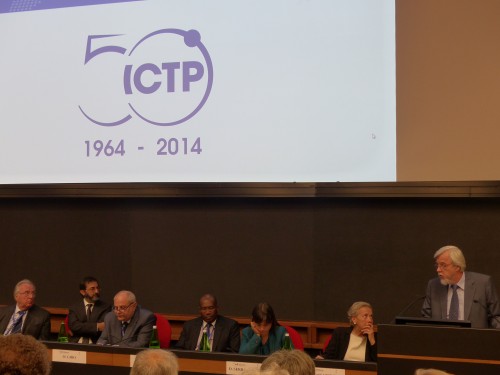
Celebrating Salam – Rolf-Dieter Heuer addresses guests at the opening session of the ICTP’s 50th-anniversary conference.
By Matin Durrani in Trieste, Italy
It was a small touch, but certainly quite surprising.
To kick off the opening session of the 50th-anniversary meeting of the International Centre for Theoretical Physics (ICTP), no-one spoke. Instead, the lights were dimmed until the audience was sitting in total darkness. Then emerged the voice of the ICTP’s founding father – the Pakistani theorist Abdus Salam, who died in 1996 – as a film started rolling on the screen at the front of the lecture hall. This was followed by a series of short video messages from selected physicists from around the world who benefited from the support of the ICTP early in their careers. As one physicist put it, the ICTP was “the launching pad” for their career. “It is a rare opportunity that so many people dream about,” added another.
View all posts by this author | View this author's profile